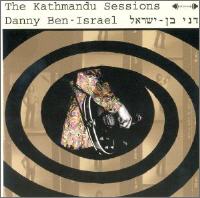Danny Ben-Israel - The Kathmandu Sessions (1970)
Release Date: 2003
Recording: tracks 1-6 recorded in "Studio Eshel", Tel-Aviv, 1968
track 7 recorded in Vienna, 1970
Label: Merry Records (Jerusalem, Israel)
Styles: psychedelic
A year after the famous Woodstock Festival, the Europeans, across the Atlantic, had their own event - the Isle of Wight Festival. The time was August, 1970, and in front of Jethro Tull, The Who, Leonard Cohen, The Doors and Miles Davis, sat thousands of Flower Children. Among those young people was one, who sitting with a flock of brown curls and a joint, didn't look very different from any of the others. It's just that he was different. Very much so. Aside from the fact that he was one of the only Israelis in the festival, for Danny Ben-Israel this was the end of a process that began with a successful career in an IDF band (Israeli Defense Force), blossomed into a position in Israeli culture as a local pop idol and ended with a shut door from the Israeli establishment.
In 1968, Ben-Israel returned to Israel from an eye-opening European trip where he discovered the world of communes, hippies and sex and decided to apply what he picked up in Europe to his music. Ben-Israel recorded "Bullshit 3 ?", the first Psychedelic protest album in Hebrew. At the same sessions he recorded six English tracks now known as "The Lost Kathmandu Sessions".
Israeli psychedelic pioneer Danny Ben-Israel was born and raised in Tel Aviv, beginning his music career while serving in the Israeli Defense Forces' Northern Command alongside future pop stars Gadi Yagil and Koby Oshrat. While still in the IDF he enjoyed a series of Israeli pop hits, and following his discharge he continued his music career, appearing in several musicals in addition to writing and recording for films. In 1968 Ben-Israel toured Europe, briefly settling in Austria and recording an LP, Happy Birthday, Rock'n'Roll; according to legend, while in Austria he experimented regularly with drugs and immersed himself fully in the burgeoning countercultural movement, returning to Tel Aviv in early 1969 intent on spreading the psychedelic gospel.
Upon his arrival home he befriended guitarist Shlomo Mizrahi -- acclaimed in some quarters as "the Israeli Jimi Hendrix" -- who led the power trio Ha'Bama Ha'Hashmalit (the Electric Stage). Together they recorded 1970's Bullshit 3 1/4, one of the first and most acclaimed Israeli psychedelic efforts -- a singular document wedding Ben-Israel's soaring, dramatic vocals (recorded in Hebrew) with distorted guitars, tape loops, and other studio experiments, the album was harshly criticized by the local media, making a negligible commercial impact despite its esteem among latter-day collectors.
Ben-Israel and Ha'Bama Ha'Hashmalit then reunited for an English-language session -- intended for release on a small American label that went bankrupt prior to the album's release, the resulting tapes languished in the vaults for over three decades, finally seeing release via the Merry Records label as The Kathmandu Sessions. Ben-Israel's subsequent creative pursuits, if any, remain unknown as of this writing. ~ Jason Ankeny
"This is a thoroughly "living" musical document today for the same reason that Zappa's first records still resonate; its long compositions are still rich with ideas! Ben-Israel's material, although based upon heavily-structured concepts, also recycles countless songs of the period, twisting them inside out with a playful vengeance. In "Kathmandu", the lyrical jokes often come from inserting the word "kathmandu" over another noun, but the composition itself is never just a basic delight. It knocks Ben-Israel's peers' melodies around like tennis balls; they mutate, lactate and vacillate beneath his acid sky. "Kathmandu" is the record's unforgettable 13-minute centerpiece, going from crazed Joplin to opium-craving spoken word, then into a netherworld of dream states, play dates and melodic fates. Just like Zappa, the twists and turns go beyond mere parody, and are rooted in classical concepts. The song approaches the brilliance of Liszt's own hilarious "Hungarian Rhapsody #2", and throughly surpasses the efforts of the Fugs and other celebrated satirists of the period.
Ben-Israel was not popular enough to inspire speculation regarding his abrupt departure from the music scene. This very lack of popularity, of course, is one reason he left psychedelia to return to stage musicals. Another is the residue of sadness that permeates The Kathmandu Sessions' last track, "The Hippies of Today are the Assholes of Tomorrow". This scary, mournful song was recorded in 1970, two years after all the other tracks, and reads like a disillusioned summation of the sixties ("The righteous of today are the bigots of tomorrow"), and of sons who fear their destiny ("Oh dear mother, save me from becoming an asshole like Father"). Like "Kathmandu", you'll always remember it, and you'll never need a pill to enjoy it." (splendidezine.com)
1. Introduction 0:36
2. Kathmandu 13:05
3. Bad Trip 2:34
4. Do You Believe In Fairytales 5:21
5. Seagulls 5:57
6. Can't Stand You 6:58
7. The Hippies Of Today Are The Assholes Of Tomorrow 11:59
state of mynd:
Music Catalog
D
